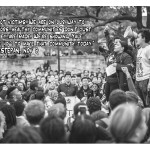My freshman year, I signed up to take a freshman seminar called “Feminism, Racism, Gender, and Sexuality” because I had never thought of these four terms in conjunction with one another. By the fourth class meeting, I realized that this class was a safe space for me to speak about my own experiences as a Queer Black woman in the United States. By the eighth class, however, I realized that navigating Feminist theory is more complicated for Black women than the Feminist movement is ready to acknowledge.
Learning about the intersectionality of racism and sexism helped me to realize that my problems were complex, and that I was not alone in my feelings. The texts that we read validated my confusion, and liberated my mind. I saw Feminism as a way to empower myself through the support of other women. As long as I tacked the term “Feminism” onto my statements, I believed, other women (especially women of color) would both agree with me and defend me, and men would bow down and listen to whatever I had to say.
Instead, Feminist discourse made me bitter. Throughout my efforts to speak for myself and defy the odds that are stacked against me, I am still struggling to connect with other Feminists.
In the freshman seminar we read several authors who showed how expressions of Black femininity resisted racist misogyny. We further learned how transgender women utilize the tools of Black femininity to empower themselves. Theory about Feminism told me that Queer Black women are the most underrepresented, misunderstood, and mistreated demographic in our society.
Realizing that I was severely oppressed was depressing. I always had high self esteem growing up, and never saw myself as a Black woman in society, but rather as an individual being. I never realized that there were elements of the social world that I did not have access to because of my race, gender, and sexuality.
Rather than using healthy introspection to deal with my issues, (as I always have) I started to look outward and blame the patriarchy for my problems. Because I did not have a balance, contemporary feminist theory has handicapped my emotional growth. I am obsessively searching for power in every stratosphere possible, and this is a draining and depressing chore. Because of this unfair burden of power-seeking, I have blamed my issues on people in my life who do not embody my version of Feminism. I have answered my moral qualms with Feminist theory, and this is very dangerous, because Feminism was not created for me as a Black woman.
Black Feminist intellectual discourse collides with Black Feminism in pop culture in a way that offers no satisfying answers. Because of this contention, I am surrounded by contradictions and complications that obscure my path toward empowerment.
Like third-wave Feminist icons Audre Lorde and bell hooks, I publicly denounced Beyoncé because she called herself a Feminist, placing me in conflict with a younger generation of Black Feminists who see the pop star as a Feminist icon. When Beyoncé is on stage and moves in ways that I don’t ever want people to expect me to move; when she Photoshops in thigh-gaps on Instagram; when she tells other “bitches” to “bow down” — I want to tell everyone that she is not a Feminist. In a world where Beyoncé is the “Queen” of Black Feminism, I have been expected to straighten my hair, put in blonde streaks, and have a certain body figure. Like her.
Beyoncé’s feminism offends me, but it is not fair for me to say that Beyoncé is not empowered, nor is it fair to antagonize other women who own their sexualities differently than I do mine. I also do not want to be coopted into Beyoncé’s feminism when it does not serve my liberation.
I want to point at women like Lauryn Hill, and demand that she be the face of Black Feminism in pop culture. Why? Because Lauryn Hill looks like me. I want to decide who represents Black female power, and that’s a problem.
by Karléh Wilson



